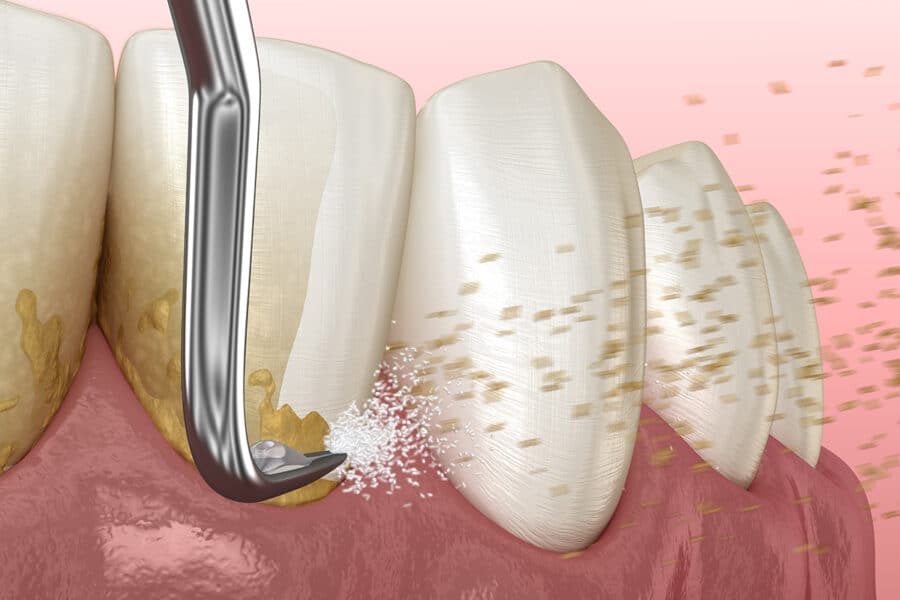What is Scaling & Root Planing?
Scaling and Root Planing (SRP) is a non-surgical gum treatment for periodontal disease. SRP is a deep cleaning that not only cleans your teeth above the gums but also below the gums where gum disease is present. This common procedure is usually the first treatment for gum disease because it helps to remove harmful bacteria called p. gingivalis, which is a main source of the active gum infection.
Who Needs Scaling & Root Planing?
Although regular cleanings provide preventive care, for those who have been diagnosed with active gum disease, regular cleanings are not enough to treat their disease. SRP is different than regular cleanings because it cleans under the gums in deep pockets where most harmful bacteria and deposits exist.
When patients have periodontitis, their gums swell, forming pockets that house harmful bacterial toxins. SRP is necessary to basically disinfect those gum pockets.
For patients with early gum disease, SRP may be the only treatment needed to heal their gums. Even if patients need to have periodontal surgery because of more advanced disease, SRP is often done prior to surgery to reduce active infection before the gum surgery is performed.
How is Scaling & Root Planing Performed?
SRP is typically performed by a registered dental hygienist who uses anesthetic, either local or topical, to numb the gums before the procedure to limit discomfort.
The procedure first involves scaling, which requires special cleaning tools to remove bacterial toxins, plaque, and calculus above and below the gums on the teeth and tooth roots. After scaling is complete, the next step is root planing, which is a method of smoothing all rough areas on the root surfaces. Smooth root surfaces keep bacteria from re-invading the gum pockets, allowing the gums to heal and reattach themselves against the tooth root.
The procedure usually takes two visits that treat half of the mouth each time.
Is Scaling & Root Planing Painful?
SRP is a non-surgical procedure that involves minimal discomfort and virtually no down time at all. Your hygienist may provide post-procedural instructions such as warm saltwater rinses and special homecare instruction that will help soothe and heal your gums quickly.
What is the Recovery After Scaling & Root Planing?
Patients can go back to work and activities following the procedure. Post-SRP, patients can eat normally and brush the area.
Most patients say that they have no discomfort after SRP.
What are the benefits of Scaling & Root Planing?
SRP helps your oral health by reducing the risk of gum disease progressing and causing more damage to your gums and jawbone. If left untreated, periodontal disease can lead to more severe infection and tooth loss.
It also helps your overall health because periodontal disease is linked to several health conditions such as diabetes, heart disease, respiratory disease, pregnancy complications, some forms of cancer, and even Alzheimer’s disease. This link is because the bacteria causing the infection in your gums can enter the bloodstream and spread throughout your body, triggering an inflammatory response, and affecting your body systems.
By reducing your risk of active periodontal disease, you can help keep your entire body healthier!
How Often Is Scaling & Root Planing Needed?
Because plaque bacteria grow in your mouth daily, gum disease does not just go away with SRP or other treatments, it must be maintained with a periodontal maintenance plan.
How often SRP needs to be done depends on your own risk factors, oral homecare, and frequency of periodontal maintenance cleanings. How often you will need to repeat the SRP procedure depends on the extent of disease and how well it can be maintained.
Periodontal maintenance cleanings are recommended between regular cleanings, usually every three or four months because that is how long it takes for harmful bacteria to regrow. These cleanings are similar to regular cleanings because they are one-visit cleanings of your whole mouth. At each appointment, your gums will be monitored for disease. If the disease returns, SRP may be necessary again.
Your best chance for reducing the need for future gum treatment is by practicing diligent oral homecare, reducing your risk factors for disease, and visiting your local periodontist regularly for periodontal maintenance cleanings.
